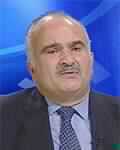HIGHLIGHTS: Bush’s Political Offensive Complicated by Reservations Of Some Congress Opposition Members and the November Congressional Elections||Bush to Address Nation Monday Night Focusing of Threat, He Believes, Saddam Poses for World Peace||Senate Votes on Draft Resolution Wednesday or Thursday, House Already Approved it||Bush Tones Down Attacks on Democrats Opposed to His Iraq Policy|| STORY: George W. Bush pushed hard for broad support from US lawmakers authorising the use of force against Iraq's Saddam Hussein.
Bush's political offensive is complicated, however, by reservations by some elected officials -- especially Senate Majority Leader Thomas Daschle, an opposition Democrat -- and the November 5 congressional election, in which control of both the House of Representatives and the Senate is in play.
"By supporting the resolution now before them, members of Congress will send a clear message to Saddam: his only choice is to fully comply with the demands of the world," Bush said in his weekly Saturday radio address.
"The time for that choice is limited," Bush added. "Supporting this resolution will also show the resolve of the United States, and will help spur the United Nations to act."
In order to convince undecided legislators, Bush late Monday will deliver a speech that White House spokesman Ari Fleischer said will focus on the threat that Saddam Hussein and Iraq "present to world peace."
Bush recently made progress towards his goal when on Wednesday he convinced leaders of the House of Representatives, where his Republican Party has a majority, to give him broad authority to use military force against Iraq.
The US Senate debated the matter Friday, with a vote on the measure most likely on Wednesday or Thursday.
Bush has received support for the measure from his former rival for 2000 Republican Party presidential nomination, Senator John McCain, as well as Senator Joseph Lieberman -- the Democratic vice-presidential candidate in the 2000 race -- and the head of the Democratic opposition in the House, Richard Gephardt.
One month before the November congressional election, the talk of war pushes other issues, including the country's fragile economy, onto the backburner. And to obtain support in the Democratic-controlled Senate, Bush must convince the opposition, as well as Republicans to follow the path set by House leaders.
Some senators believe that a diplomatic solution must be more aggressively pursued, with a military solution only as a last resource.
"We are rushing into war without fully discussing why, without thoroughly considering the consequences, or without making any attempt to explore what steps we might take to avert conflict," said Senator Robert Byrd, a veteran Democrat from West Virginia.
"The newly bellicose mood that permeates this White House is unfortunate, all the more so because it is clearly motivated by campaign politics," Byrd said.
Facing these criticisms, Bush has considerably toned down his attacks on Democratic senators over the past days, especially after his claim that Democrats were more interested in catering to special interests than in the safety of the American people was rejected angrily by Daschle.
PHOTO CAPTION
"By supporting the resolution now before them, members of Congress will send a clear message to Saddam: his only choice is to fully comply with the demands of the world," Bush said in his weekly Saturday radio ad
- Author:
& News Agencies - Section:
WORLD HEADLINES


 Home
Home Discover Islam
Discover Islam Quran Recitations
Quran Recitations Lectures
Lectures
 Fatwa
Fatwa Articles
Articles Fiqh
Fiqh E-Books
E-Books Boys & Girls
Boys & Girls  Hajj Rulings
Hajj Rulings Hajj Fatwas
Hajj Fatwas














